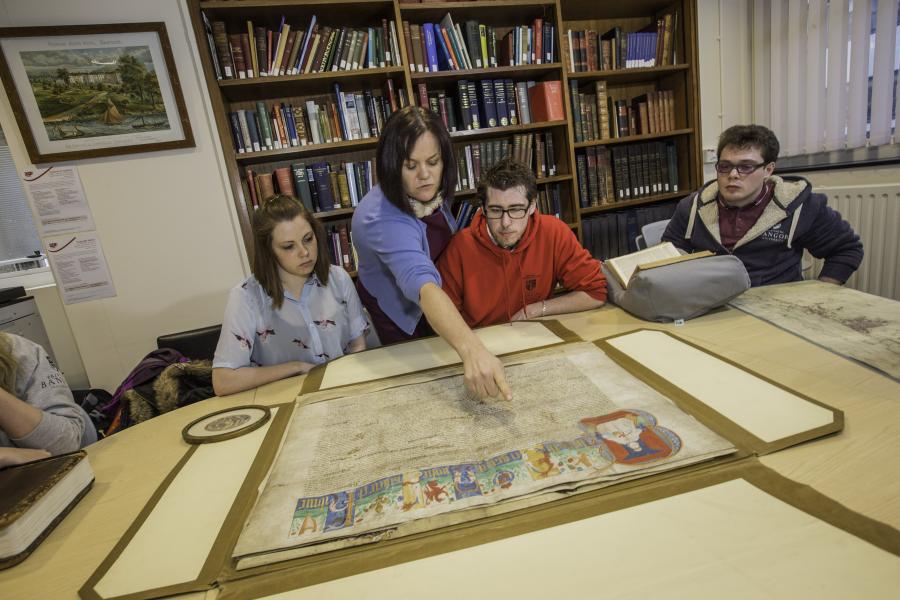About This Course
Do you want to learn more about government and society and the workings of political systems? Are you interested in the way people, institutions and ideas interact? Our course draws together existing teaching and research expertise on important issues surrounding the influence of power, governance, sovereignty, conflict, order, mediation, obligation, justice, accountability, legitimacy, security, and decision-making.
Our Politics (with Foundation Year) option is a four-year course with an integrated foundation year which leads to the same qualification as our three-year honours degree. It has been specifically designed for those wanting to undertake degree-level study but who may not meet the entry requirements or have traditional qualifications.
The Foundation Year (Year 0) offers you the chance to expand and strengthen your confidence, skills and knowledge – ensuring that you are well-prepared and qualified to progress into Year 1 of the undergraduate degree.
Why choose Bangor University for this course?
- Students who follow this programme will be introduced to interdisciplinary approaches to the discussions of theoretical, philosophical, institutional and issue-based concerns revolving around governance.
- Our History, Philosophy and Social sciences staff undertake research of national and international reputation and have written major textbooks and articles published in top academic journals. Their research is an integral part of teaching.
- We aim to provide a friendly, supportive and stimulating learning environment, supplemented by contributions from practitioners in the statutory, voluntary and independent sectors.
- Students from countries worldwide study Social Sciences degrees at Bangor - for undergraduate, masters and research training, creating a dynamic learning environment.
Additional Course Options
This course is available with a Placement Year option where you will study for 1 additional year. The Placement Year is undertaken at the end of the second year and students are away for the whole of the academic year.
The Placement Year provides you with a fantastic opportunity to broaden your horizons and develop valuable skills and contacts through working with a self-sourced organisation relevant to your degree subject. The minimum period in placement (at one or more locations) is seven calendar months; more usually you would spend 10-12 months with a placement provider. You would normally start sometime in the period June to September of your second year and finish between June and September the following year. Placements can be UK-based or overseas and you will work with staff to plan and finalise the placement arrangements.
You will be expected to find and arrange a suitable placement to complement your degree and will be fully supported throughout by a dedicated member of staff at your academic School and the University’s Careers and Employability Services.
You will have the opportunity to fully consider this option when you have started your course at Bangor and can make an application for a transfer onto this pathway at the appropriate time. Read more about the work experience opportunities that may be available to you or, if you have any questions, please get in touch.
This course is available with an International Experience Year option where you will study or work abroad for 1 additional year. You will have ‘with International Experience’ added to your degree title on graduating.
Studying abroad is a great opportunity to see a different way of life, learn about new cultures and broaden your horizons. With international experience of this kind, you’ll really improve your career prospects. There are a wide variety of destinations and partner universities to choose from. If you plan to study in a country where English is not spoken natively, there may be language courses available for you at Bangor and in your host university to improve your language skills.
You will have the opportunity to fully consider this option at any time during your degree at Bangor and make your application. If you have any questions in the meantime, please get in touch.
Read more about the International Experience Year programme and see the studying or working abroad options on the Student Exchanges section of our website.
Course Content
This course seeks to help students understand the nature, meaning and impact of politics as a human activity. Students will learn to apply concepts, methods and theories used in the study of politics to analyse political ideas, practices and institutions in both historical and contemporary contexts
This course will be taught through a combination of lectures, seminar, tutorials and workshops. Assessment will involve a mixture of examinations, essays, written work, presentations and portfolios.
Modules for the current academic year
Module listings are for guide purposes only and are subject to change. Find out what our students are currently studying on the Politics (with Foundation Year) BA (Hons) Modules page.
Course content is for guidance purposes only and may be subject to change.
Facilities
General University Facilities
Library and Archive Services
Our four libraries provide a range of attractive study environments including collaborative work areas, meeting rooms and silent study spaces.
We have an extensive collection of books and journals and many of the journals are available online in full-text format.
We house one of the largest university-based archives not only in Wales, but also the UK. Allied to the Archives is the Special Collections of rare printed books.
Learning Resources
There is a range of learning resources available, supported by experienced staff, to help you in your studies.
The University’s IT Services provides computing, media and reprographics facilities and services including:
- Over 1,150 computers for students, with some PC rooms open 24 hours a day
- Blackboard, a commercial Virtual Learning Environment, that makes learning materials available on-line.
Course Costs
General University Costs
Home (UK) students
- The cost of a full-time undergraduate course is £9,000 per year (2021/22 entry and 2022/23 entry).
- The fee for all placement, international, and sandwich years is £1,350 (2021/22 and 2022/23).
- More information on fees and finance for Home (UK) students.
International (including EU) students
Additional Costs
There are also some common additional costs that are likely to arise for students on all courses, for example:
- If you choose to study abroad or take the International Experience Year as part of your course.
- If you attend your Graduation Ceremony, there will be a cost for gown hire (£25-£75) and cost for additional guest tickets (c.£12 each).
Course-specific additional costs
Depending on the course you are studying, there may be additional course-specific costs that you will be required to meet. These fall into three categories:
- Mandatory Costs: these are related to a particular core or compulsory module that you’ll be required to complete to achieve your qualification e.g. compulsory field trips, uniforms for students on placement, DBS Check.
- Necessarily Incurred Costs: these may not be experienced by all students, and will vary depending on the course e.g. professional body membership, travel to placements, specialist software, personal safety equipment.
- Optional Costs: these depend on your choice of modules or activity and they are shown to give you an indication of the optional costs that may arise to make sure your choice is as informed as possible. These can include graduation events for your course, optional field trips, Welcome Week trips.
Entry Requirements
Offers are tariff based, 48 -88 tariff points, from Level 3 qualifications* e.g.
- A Levels (including: AS-levels, General Studies)
- International Baccalaureate
- Extended Project Qualification (EPQ)
- BTEC Diplomas and Certificate are accepted and Cambridge Technical Diplomas / Certificates
- Cambridge Technical Diplomas and Certificates
- City & Guilds Advanced Technical Diplomas
- Welsh Baccalaureate is accepted
- Scottish Highers
- Irish Leaving Certificate is accepted
- T-levels: considered on a case-by-case basis
We also welcome applications from mature learners. Mature students and/or those with other qualifications are considered on individual merit
*For a full list of accepted Level 3 qualifications, go to www.ucas.com.
General University Requirements
To study for a degree, you’ll be asked for a minimum of UCAS Tariff points. For a fuller explanation of the UCAS Tariff Points, please see www.ucas.com.
We accept students with a wide range of qualifications and backgrounds and consider each application individually.
All students need to have good basic skills and the University also values IT and communication skills.
As part of the University’s policy, we consider applications from prospective disabled students on the same grounds as all other students.
We also consider applications from mature students who can demonstrate the motivation and commitment to study a university programme. Each year we enrol a significant number of mature students. For more information about studying as a mature student, see our Studying at Bangor section of the website.
EU and International Students' Entry Requirements
For detailed guidance on the entry requirements for EU and International Students, including the minimum English Language entry requirement, please visit the Entry Requirements by Country pages. International applicants can also visit the International Education Centre section of our website for further details.
Bangor University offers International Incorporated Bachelor Degrees for International students whose High School qualification is not equivalent to the UK school leaving qualification. The first year (or Year 0) is studied at Bangor University International College, an embedded College on our University campus and delivered by Oxford International Education Group.
Careers
This course will prepare students for a range of employment options – especially in fields which require skills of communication, analyzing large quantities of information, and understanding issues of governance and society.
Those choosing to take advantage of the work placement opportunities (e.g. work placement module, or a placement year) will gain hands on experience and an insight into work opportunities within the broader field. opportunities may include e.g. local government, charities, schools, museums and archival repositories.
Possible future career options may include local and/or national government, teaching, management and administration. This course will also be an excellent foundation prior to further postgraduate study, such as a Masters degrees in politics.
Opportunities at Bangor
The University’s Careers and Employability Service provides a wide range of resources to help you achieve your graduate ambitions.
The Bangor Employability Award (BEA)
The BEA is a comprehensive online course that you can work through at your own pace, taking you through all the steps you need to take to explore, prepare and apply for your dream career.
Internships
Bangor University runs a paid internship scheme within the university’s academic and service departments.
Student Volunteering
Volunteering widens your experience and improves your employability. Find out more about volunteering on the Students’ Union’s website.





